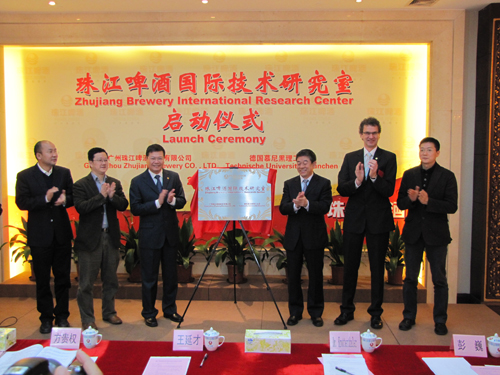The Supreme Court of Victoria has ruled that a meeting of shareholders of Foster’s Group will take a vote on the proposed demerger of Foster’s beer and wine operations. The shareholders meeting will be held in Melbourne on Friday, 29 April 2011. Foster’s had said in February that they would proceed with the separation of their beer and wine operations into two separately-listed companies. It has finally been revealed that under the terms of the demerger, shareholders will receive one share in the wine unit, Treasury Wine Estates, for every three Foster’s shares.
On 9 March 2011, the Zhujiang Beer International Research Center was opened in a ceremony attended by leading figures from politics and academia at Zhujiang brewery, Guangzhou, Guangdong Province, China.
Fears of a nuclear catastrophe in Japan after last week’s earthquake and tsunami prompted a near 11 percent slide in the country’s main stock market on Tuesday 15 March 2011. Keeping your eyes glued on the performance of the Japanese stock market is almost obscene, given that an estimated 10,000 people lost their lives and millions of Japanese have more pressing worries these days.
Australia’s leading retailer Woolworths again faces the scrutiny of Australia’s competition custodians after it revealed in late February 2011 an AUD 340 million deal to buy the dominant direct wine merchant Cellarmasters.
Consolidation of the Chinese beer market is gathering pace. China Resources Enterprises, which is in a joint venture with SABMiller and also happens to be China’s major brewer, bought a 21.37 percent stake in Kingway Brewery on 9 March 2011 according to a Hong Kong stock exchange disclosure.
When Turkey’s Islamist-rooted conservative government introduced another 30 percent tax hike on alcohol in October 2010, amidst protests from café owners and beverage producers, many market observers thought that Diageo’s then rumoured deal with Turkey’s raki maker Mey Icki would fall through. But no. Diageo agreed on 21 February 2011 to buy Mey Icki for GBP 1.3 billion (USD 2.1 billion). Given that Diageo declined to buy Swedish vodka Absolut in 2008, the Turkish move is the first multibillion-dollar deal by Diageo in more than a decade. What is more, it is indicative of a major change in policy at Diageo’s. For the first time, Diageo was prepared to spend loads of money on a drinks business in an emerging market as “complex” (ahem) as Turkey’s.
Who will buy Foster’s beer business? That’s a really good question as the Foster’s Group prepares for its demerger. Already, Japanese beer group Asahi Breweries has taken itself out of the running to buy Foster’s beer arm, calling the assets too expensive, as did Coca-Cola Amatil’s boss Terry Davis who also thinks Foster’s looks a little too pricey. Which thins the ranks of the usual suspects down to SABMiller.
It’s a sad sight to behold. Walk into any Australian alcohol sales outlet and you will notice immediately the promotion offers clinging on to wine bottle necks. It cannot have been fun being an Australian wine producer these past years as the industry suffered from overproduction and a rising Australian currency which seriously hampered export sales. On 15 February 2011 Foster’s reported that during the first half of its current financial year (ended 31 December 2011) wine profit from sales in Australia and New Zealand rose 7 percent to AUD 39.6 million. Profit from wine in North America and South America gained 24 percent to AUD 54.2 million while in Europe, the Middle East and Africa wine turned to a loss of AUD 500,000 from a profit of AUD 12 million a year earlier.
NSF International, a global not-for-profit public health and safety organization, has opened its new NSF Shanghai Testing Laboratory in Shanghai, China, expanding its services in Asia to include testing in the areas of food equipment, dietary supplements and ingredients, and consumer products. Additionally, the facility and staff will provide on-site training in the areas of food safety, pharmaceutical, medical device and dietary supplement manufacturing.
Many thought they would never see it happen. On 15 February 2011 Foster’s Group finally announced its split to go ahead in May this year.

